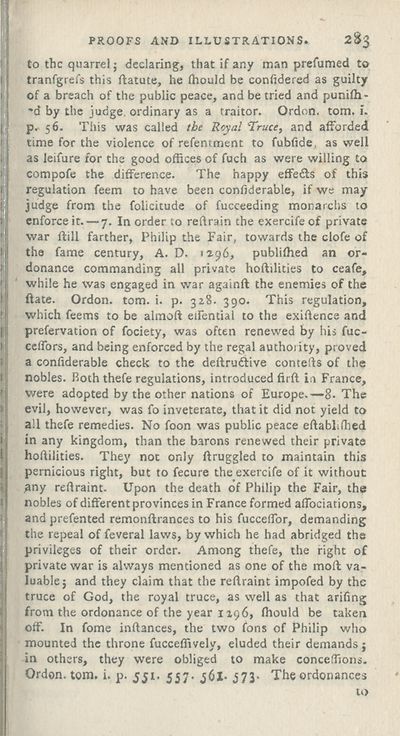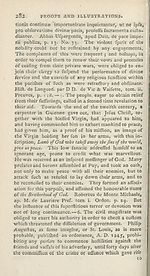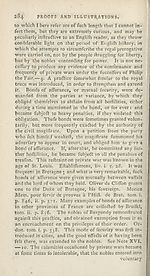Download files
Complete book:
Individual page:
Thumbnail gallery: Grid view | List view

PROOFS AND ILLUSTRATIONS. 283
to the quarrel; declaring, that if any man prefumed to
tranfgrefs this ftatute, he (hould be confidered as guilty
of a breach of the public peace, and be tried and punifh-
*d by the judge ordinary as a traitor. Ordon. tom. i.
p. 56. This was called the Royal 'Truce, and afforded
time for the violence of refentment to fubfide as well
as leifure for the good offices of fuch as were willing to
compofe the difference. The happy effe£ts of this
regulation feem to have been confiderable, if we may
judge from the folicitude of fucceeding monarchs to
enforce it—7. In order to reftrain the exercife of private
war fttll farther, Philip the Fair, towards the clofe of
the fame century, A. D. >196, publifhed an or-
donance commanding all private hoftilities to ceafe,
while he was engaged in war againft the enemies of the
ftate. Ordon. tom. i. p. 328. 390. This regulation,
which feems to be almoft elfential to the exiftence and
prefervation of fociety, was often renewed by his fuc-
celfors, and being enforced by the regal authoiity, proved
a confiderable check to the deftruttive Cornells of the
nobles. Both thefe regulations, introduced firft in France,
were adopted by the other nations of Europe.—8- The
evil, however, was fo inveterate, that it did not yield to
all thefe remedies. No foon was public peace eftabhfhed
in any kingdom, than the barons renewed their private
hoftilities. They not only ftruggled to maintain this
pernicious right, but to fecure the exercife of it without
Any reftraint. Upon the death of Philip the Fair, the
nobles of different provinces in France formed affociations,
and prefented remonftrances to his fuccelfor, demanding
the repeal of feveral laws, by which he had abridged the
privileges of their order. Among thefe, the right of
private war is always mentioned as one of the moft va¬
luable; and they claim that the reftraint impofed by the
truce of God, the royal truce, as well as that arifing
from the ordonance of the year 1196, fhould be taken
off. In fome inftances, the two fons of Philip who
mounted the throne fucceffively, eluded their demands;
in others, they were obliged to make conceffions.
Ordon. tom. i. p. jji. 557. 361- 373- The ordonances
to
to the quarrel; declaring, that if any man prefumed to
tranfgrefs this ftatute, he (hould be confidered as guilty
of a breach of the public peace, and be tried and punifh-
*d by the judge ordinary as a traitor. Ordon. tom. i.
p. 56. This was called the Royal 'Truce, and afforded
time for the violence of refentment to fubfide as well
as leifure for the good offices of fuch as were willing to
compofe the difference. The happy effe£ts of this
regulation feem to have been confiderable, if we may
judge from the folicitude of fucceeding monarchs to
enforce it—7. In order to reftrain the exercife of private
war fttll farther, Philip the Fair, towards the clofe of
the fame century, A. D. >196, publifhed an or-
donance commanding all private hoftilities to ceafe,
while he was engaged in war againft the enemies of the
ftate. Ordon. tom. i. p. 328. 390. This regulation,
which feems to be almoft elfential to the exiftence and
prefervation of fociety, was often renewed by his fuc-
celfors, and being enforced by the regal authoiity, proved
a confiderable check to the deftruttive Cornells of the
nobles. Both thefe regulations, introduced firft in France,
were adopted by the other nations of Europe.—8- The
evil, however, was fo inveterate, that it did not yield to
all thefe remedies. No foon was public peace eftabhfhed
in any kingdom, than the barons renewed their private
hoftilities. They not only ftruggled to maintain this
pernicious right, but to fecure the exercife of it without
Any reftraint. Upon the death of Philip the Fair, the
nobles of different provinces in France formed affociations,
and prefented remonftrances to his fuccelfor, demanding
the repeal of feveral laws, by which he had abridged the
privileges of their order. Among thefe, the right of
private war is always mentioned as one of the moft va¬
luable; and they claim that the reftraint impofed by the
truce of God, the royal truce, as well as that arifing
from the ordonance of the year 1196, fhould be taken
off. In fome inftances, the two fons of Philip who
mounted the throne fucceffively, eluded their demands;
in others, they were obliged to make conceffions.
Ordon. tom. i. p. jji. 557. 361- 373- The ordonances
to
Set display mode to:
![]() Universal Viewer |
Universal Viewer | ![]() Mirador |
Large image | Transcription
Mirador |
Large image | Transcription
| Antiquarian books of Scotland > Kings & rulers > History of the reign of the Emperor Charles V. > Volume 1 > (301) |
|---|
| Permanent URL | https://digital.nls.uk/109185943 |
|---|
| Description | By William Robertson. London : Cadell and Davies, 1798. |
|---|---|
| Shelfmark | ABS.1.76.13 |
| Additional NLS resources: | |
| Description | Thousands of printed books from the Antiquarian Books of Scotland collection which dates from 1641 to the 1980s. The collection consists of 14,800 books which were published in Scotland or have a Scottish connection, e.g. through the author, printer or owner. Subjects covered include sport, education, diseases, adventure, occupations, Jacobites, politics and religion. Among the 29 languages represented are English, Gaelic, Italian, French, Russian and Swedish. |
|---|

